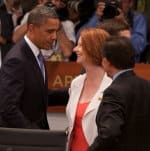The Asia-Pacific Economic Cooperation (APEC) forum in Honolulu, Hawaii has adopted a declaration to phase out inefficient fossil fuel subsidies while giving green goods a break on tariffs.
The Honolulu Declaration details steps toward building a “seamless regional economy”, of which Australia is a part of.
In an official release, the leaders of APEC nations stated, “We are committed to advancing our shared green growth objectives. We can and must address both the region’s economic and environmental challenges by speeding the transition toward a global low-carbon economy in a way that enhances energy security and creates new sources of economic growth and employment.”
Next year, participating economies will develop a list of goods that contribute to green growth. These goods will be granted a break on applied tariff rates, which will then be set a maximum of 5% . This may benefit Australian manufacturers of items such as wind turbine components, solar cells or other energy efficiency related equipment that are exporting or considering exporting to APEC markets.
Australian Prime Minister Julia Gillard was very positive about this development.
“Now, this is unambiguously good news for Australia. We do not have tariffs of more than 5 per cent on any environmental good. What that means is that we won’t experience any of the pain that would come from those tariff reductions, but we will experience the benefit of being able to get environmental products which we produce into the economies of APEC with less of a tariff load.”
The leaders have also committed to the phasing out of “inefficient fossil-fuel subsidies that encourage wasteful consumption, while recognizing the importance of providing those in need with essential energy services, and set up a voluntary reporting mechanism on progress, which we will review annually.”
APEC has also agreed to rein in the ballooning carbon footprint of the region by reducing energy intensity by 45 per cent by 2035. Energy intensity is a measure of the energy efficiency of a nation’s economy and is calculated as units of energy per unit of Gross Domestic Product (GDP).
The full “Honolulu Declaration – Toward a Seamless Regional Economy” can be viewed here. Further detail on Annex C – Trade and Investment in Environmental Goods and Services can be viewed here.












































